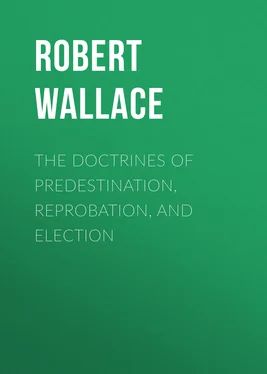Robert Wallace - The Doctrines of Predestination, Reprobation, and Election
Здесь есть возможность читать онлайн «Robert Wallace - The Doctrines of Predestination, Reprobation, and Election» — ознакомительный отрывок электронной книги совершенно бесплатно, а после прочтения отрывка купить полную версию. В некоторых случаях можно слушать аудио, скачать через торрент в формате fb2 и присутствует краткое содержание. Жанр: foreign_prose, foreign_religion, Философия, foreign_psychology, foreign_antique, на английском языке. Описание произведения, (предисловие) а так же отзывы посетителей доступны на портале библиотеки ЛибКат.
- Название:The Doctrines of Predestination, Reprobation, and Election
- Автор:
- Жанр:
- Год:неизвестен
- ISBN:нет данных
- Рейтинг книги:4 / 5. Голосов: 1
-
Избранное:Добавить в избранное
- Отзывы:
-
Ваша оценка:
- 80
- 1
- 2
- 3
- 4
- 5
The Doctrines of Predestination, Reprobation, and Election: краткое содержание, описание и аннотация
Предлагаем к чтению аннотацию, описание, краткое содержание или предисловие (зависит от того, что написал сам автор книги «The Doctrines of Predestination, Reprobation, and Election»). Если вы не нашли необходимую информацию о книге — напишите в комментариях, мы постараемся отыскать её.
The Doctrines of Predestination, Reprobation, and Election — читать онлайн ознакомительный отрывок
Ниже представлен текст книги, разбитый по страницам. Система сохранения места последней прочитанной страницы, позволяет с удобством читать онлайн бесплатно книгу «The Doctrines of Predestination, Reprobation, and Election», без необходимости каждый раз заново искать на чём Вы остановились. Поставьте закладку, и сможете в любой момент перейти на страницу, на которой закончили чтение.
Интервал:
Закладка:
“I doubt not through the ages one increasing purpose runs,
And the thoughts of men are widened with the process of the suns.”
In 1879 the United Presbyterian Church adopted what is known as the “Declaratory Act,” which is a clear departure from the rigid Calvinism of the Confession of Faith. In this declaration God’s love is said to be world-wide, and the propitiation of Christ to be for the “sins of the whole world.” They hold the Confession dogmas in harmony with the Declaratory Act, but it is an attempt to put the new cloth on the old garment, or the new wine into the old bottles. It is impossible that God can love the whole world, and yet foredoom millions to be lost. The two views are destructive of each other. This church, one of the most intelligent in the country, cannot stand where it now is. It is bound to go forward.
PART I.—PREDESTINATION
CHAPTER I.
THE WORD PREDESTINATION, AND THE DOCTRINE AS HELD BY CALVINISTS
THE word “predestinate” signifies, according to the Imperial Dictionary , “to predetermine or foreordain,” “to appoint or ordain beforehand by an unchangeable purpose.” The noun, according to the same authority, denotes the act of decreeing or foreordaining events; the act of God, by which He hath from eternity unchangeably appointed or determined whatsoever comes to pass. It is used particularly in theology to denote the preordination of men to everlasting happiness or misery. The term is used four times in the New Testament, and comes from the Greek word proorizo , which signifies, “to determine beforehand,” “to predetermine” (Liddell and Scott). Robinson gives as its meaning, “to set bounds before,” “to predetermine,” “spoken of the eternal decrees and counsels of God.” According to the lexicographers, the meaning—as far as the word is concerned—is plain enough. It is quite clear from the Scriptures that God predestinates or foreordains. This is admitted on all sides. But here the questions arise—What is the nature of God’s predestination? and does it embrace all events? The Confession of Faith gives the following deliverance on the subject—“God from all eternity did, by the most wise and holy counsel of His own will, freely and unchangeably foreordain whatsoever comes to pass.” The Larger and Shorter Catechisms express the same idea. This was the opinion of the Westminster divines, and is the professed faith of Presbyterians in general in Scotland. One of the most eminent theologians of the school of Calvin—Dr. C. Hodge—vindicates this deliverance of the Assembly. He says, “The reason; therefore, why any event occurs, or that passes from the category of the possible into that of the actual, is that God has so decreed” (Vol. I., p. 531). He says again, “The Scriptures teach that sinful acts, as well as those which are holy, are foreordained” (Vol. I., p. 543). And, again, “The acts of the wicked in persecuting the early Church were ordained of God, as the means of the wider and more speedy proclamation of the Gospel” (Vol. I., p. 544). He says, moreover, “Whatever happens God intended should happen, that to Him nothing can be unexpected, and nothing contrary to His purposes” (Vol. II., p 335). The same writer, in speaking of the usage of the term “predestination,” remarks, “It may be used first in the general sense of foreordination. In this sense it has equal reference to all events, for God foreordains whatsoever comes to pass:” It will thus be seen that the Confession, and the Catechisms, and Hodge, as one of the most eminent expounders of these formularies, uphold the doctrine, that everything which happens was foreordained by God to happen. The doctrine as thus stated is clearly the foundation of the whole system of Calvinism. If this is shaken, the entire structure topples to its base. Being so important, its advocates have sought to strengthen it by appealing to the Divine attributes and to passages from holy writ. Let us then examine their arguments derived from the attributes, and the texts they have adduced.
CHAPTER II.
CALVINISTIC PREDESTINATION IN REFERENCE TO DIVINE WISDOM
The wisdom of God is held as proving universal foreordination. Being infinitely wise—such is the argument—He will act upon a plan, as in creation, and as wise people do in regard to affairs in general. And this is perfectly correct. The question, however, is not whether God has a plan, but what that plan comprehends? Sin being a factor in the programme of life, the Divine wisdom or plan will be exercised in reference to it. There are two ways in which this may be done. It may be foreordained as part of the plan, as is seen in the above extracts. But another way is this: The Divine wisdom may be exercised in regard to sin, not as ordaining it, but as overruling it, and in turning it to account. That the evil deeds of men bring into view features of the Divine character which would not otherwise have been seen, is no doubt true, but this does not save the wrong-doers from the severest blame. But what is wisdom? It is the choosing of the best means to effect a good end. The ultimate end of creation is the glory of God, as He is the highest and the best of beings. There can be nothing higher than himself He desires the confidence and the love of men.
“Love is the root of creation, God’s essence.
Worlds without number
Lie in His bosom like children; He made them for this purpose only,—
Only to love and be loved again.”—Tegner.
Men are asked to give Him their trust and love. It is right that they should do so, for He is infinitely worthy of them. But what are sinful actions? Essentially they are foolish, and issue in misery. And if God foreordained them, how can we esteem Him as wise and good? And if not to our intelligence wise and good, how can we give Him our confidence and love? Trust and love are based upon the perception of the true and the good. If I find a man who is destitute of these qualities of character, to love him with approval is, as I am constituted, an impossibility. But to ordain the “acts of the wicked,” as Hodge says that God did, in order to spread Christianity, was neither just nor good. It was doing evil that good might come. Instead of being wise it was, if it were so, an exhibition of unwisdom as regards the very end of creation, as it was fitted to drive men away from, instead of bringing them to, God. And yet wisdom, Divine wisdom, was exercised in reference to those very persecutions. It was true, as Tertullian said, that the “blood of the martyrs was the seed of the Church.” By means of the sufferings of the early Christians men’s minds were directed to that religion which supported its adherents in the midst of their accumulated sorrows. Their patience, their heroic bravery in facing grim death, threw a halo of moral glory around the martyrs which touched the hearts of true men who lived in the midst of general degeneration. The Christians were driven from their homes, but they carried the truth with them.
“The seeds of truth are bearded, and adhere we know not when, we know not where.” In the world of nature there are seeds with hooks, and others have wings to be wafted by the breeze to their proper habitat. And if Divine wisdom watches over the seeds of the vegetable kingdom, does it not stand to reason that it will do so in regard to truth? God overrules the evil, and makes it the occasion of good. Joseph was immured in jail, but from it he ascended to a seat next the throne. Christ was crucified, but from the blessed cross came streams of blessing. Paul was incarcerated, but from his prison came “thoughts that breathe and words that burn,” that have kept alive the flame of piety for more than a thousand years. The people of God still suffer, but, like the asbestos cloth when thrown into the fire, they, by these sufferings, become purified and made meet for the coming glory. In thus overruling evil, God, we say, shows the highest wisdom and love fitted to secure our trust and affection; but to ordain evil would be an illustration of supreme folly, fitted to lower him in the estimation of angels and of men.
Читать дальшеИнтервал:
Закладка:
Похожие книги на «The Doctrines of Predestination, Reprobation, and Election»
Представляем Вашему вниманию похожие книги на «The Doctrines of Predestination, Reprobation, and Election» списком для выбора. Мы отобрали схожую по названию и смыслу литературу в надежде предоставить читателям больше вариантов отыскать новые, интересные, ещё непрочитанные произведения.
Обсуждение, отзывы о книге «The Doctrines of Predestination, Reprobation, and Election» и просто собственные мнения читателей. Оставьте ваши комментарии, напишите, что Вы думаете о произведении, его смысле или главных героях. Укажите что конкретно понравилось, а что нет, и почему Вы так считаете.












